A Study Reveals CNN and MSNBC’s Glaring Gaza Double Standard
Palestinians received far less sympathetic and humanizing coverage than either Israelis or Ukrainians, a Nation analysis has found.
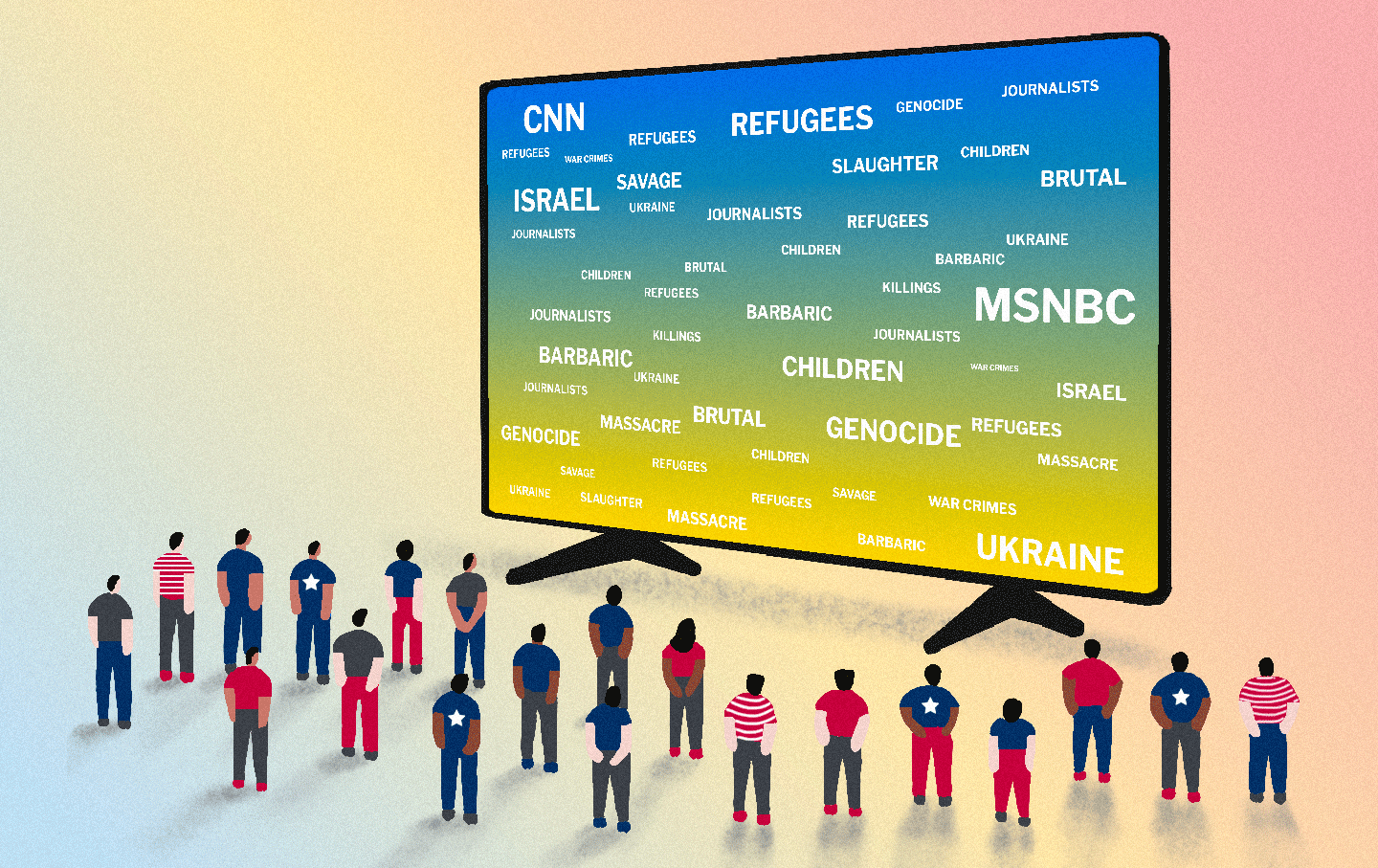
CNN and MSNBC’s first 100 days of reporting on Israel’s war on Gaza showed a consistent double standard in its coverage, with Palestinians receiving far less sympathetic and humanizing coverage than either Israelis during the same period or Ukrainians during the first 100 days after Russia’s invasion, a Nation analysis of major media coverage has found.
The two cable news outlets, which both play an influential role in shaping center-left US views on Gaza, routinely focused on the human suffering and stakes of Ukrainians—as well as the victims and survivors of the October 7 attacks, which killed roughly 1,200 Israelis—at a far greater clip than that of Palestinian victims. This disparity persisted despite much higher casualties among Palestinian civilians, whose deaths—during our survey period—exceeded Ukrainian civilian deaths by 500 percent.
The third major cable network, Fox News, was not included in our analysis because the focus of our study is in the formation of liberal and Democratic Party-aligned support for Israel’s war on Gaza. Polls repeatedly show that Republican support for Israel is far greater than that of liberals and Republican leaders are more overtly hawkish in their support for whatever Prime Minister Benjamin Netanyahu does in his quest for so-called “total victory” against Hamas. Thus, given that the siege, bombing, and use of starvation and disease in Gaza was done with the full-blown support of a Democratic president for almost a year, the curation of liberal opinion surrounding Gaza since October 2023 is important to study and better understand.
To do this, our study compares CNN and MSNBC editorial priorities, reporting and commentary with respect to Israel’s war on Gaza and Russia’s invasion of Ukraine.
We do not do this to imply that Ukrainians were somehow unworthy of the compassionate coverage they received. But highlighting biases in US media is impossible without having a point of reference, and given the closeness in time and the total inversion of the geopolitical dynamics, the coverage of Ukraine is a useful way of showing that American media can, indeed, be broadly sympathetic when it chooses to be. The point of this analysis is not that US media should reduce its coverage of the tragedies in Ukraine to achieve parity with Gaza, but that it should elevate its coverage of the suffering in Gaza to be comparable to that of Ukraine, with the same urgent and moralizing tone.
CNN and MSNBC’s pointed lack of sympathy with Palestinians is also important to examine because the media’s consistent dehumanization and erasure of their suffering has helped 12 months of a killing campaign, backed by unending American military and political support, that is unprecedented in the 21st century, according to Oxfam International. Israel’s operations have been characterized by a level of brutality that is difficult to capture with statistics, but here are two examples: As of January, Save the Children was reporting that an average of 10 children a day in Gaza were losing one or both of their legs per day, and in April, UN Women estimated that 19,000 children had been orphaned.
This analysis examines the media discourse that emerged in the first 100 days of both conflicts when the narratives that enabled this kind of onslaught were established. We chose this time frame because it is long enough to get a meaningful sample, but early enough to allow the study to think critically about how US media played a role—from the outset—in justifying Palestinian deaths while protesting and properly contextualizing Ukrainian and Israeli ones.
You can find the full data set for this study here.
Finding 1: Sympathetic victims like journalists, refugees, and children are mentioned more in Ukraine than in Gaza, despite a significantly wider gap in casualties and human suffering.
Victims of war in Gaza who could be expected to elicit sympathy from audiences—like journalists, refugees, and children—received comparatively little coverage during the first 100 days of Israel’s assault, especially given the scale of their suffering.
In the first 100 days after Russia’s invasion of Ukraine, 262 children were killed. In the first 100 days of Israel’s assault on Gaza, more than 10,000 children were killed (the true number is likely much higher). But mentions of child deaths and related terms were 33.4 percent higher for Ukraine than for Gaza (4,223 versus 3,632). (You can find the full list of terms we used in our data set.) During this time frame, CNN mentioned child victims of the war 2,446 times for Ukraine versus 2,110 times for Gaza, and MSNBC mentioned child victims of the Ukraine war 1,775 times versus 1,522 times for Gaza. This means that, for each child death from Ukraine, children received the equivalent of 16.1 mentions on air, whereas children in Gaza received the equivalent of 0.36 mentions.
In that period, 77 journalists were killed in Gaza, versus eight in the first 100 days of Russia’s invasion. Yet, despite this huge disparity, deaths of media workers in Ukraine were given roughly equal mention, the analysis found: 196 mentions vs. 198 mentions of Gaza journalists. This means that each journalist death in Gaza received the equivalent of 2.5 mentions, whereas each journalist death in Ukraine received the equivalent of 24 mentions.
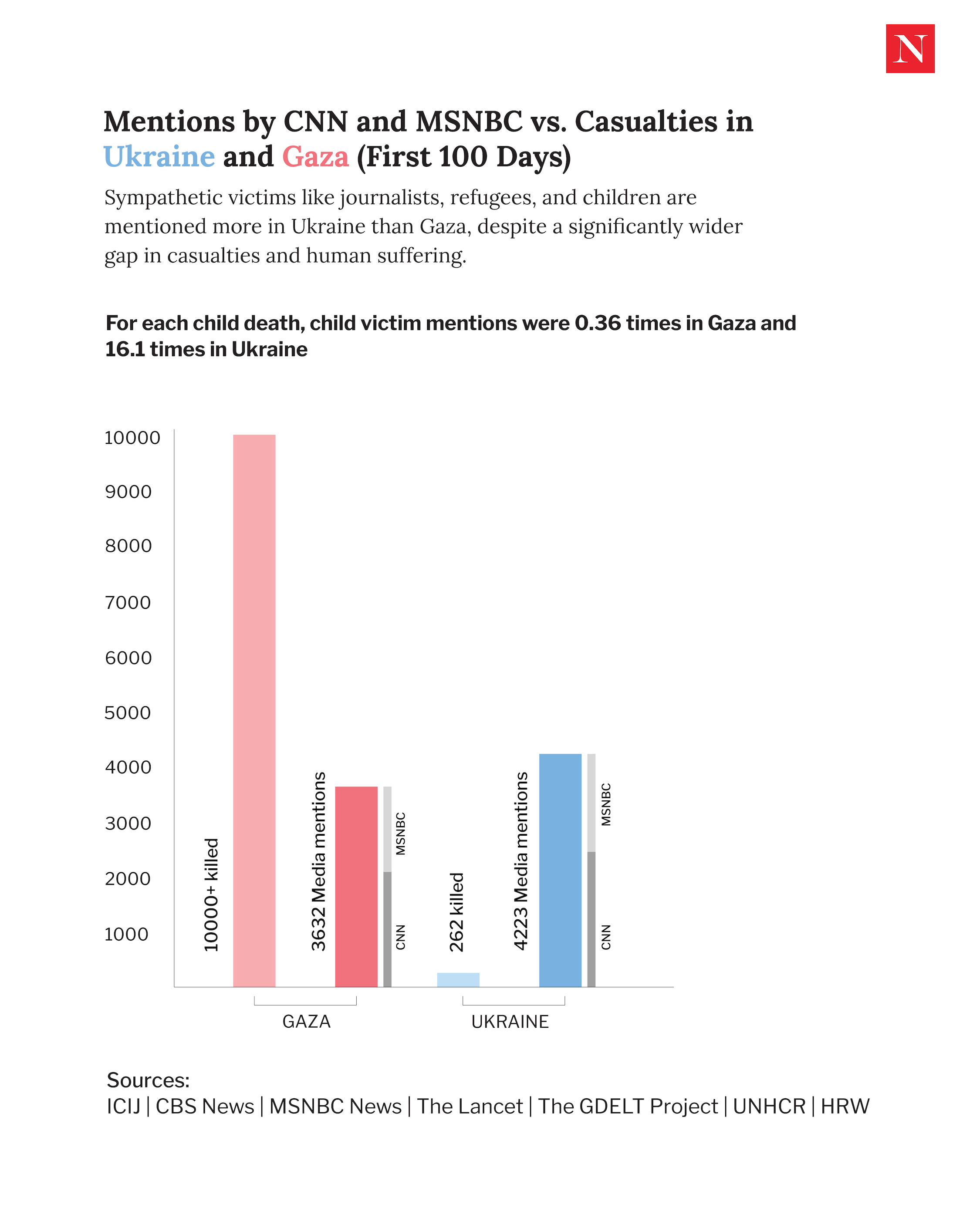
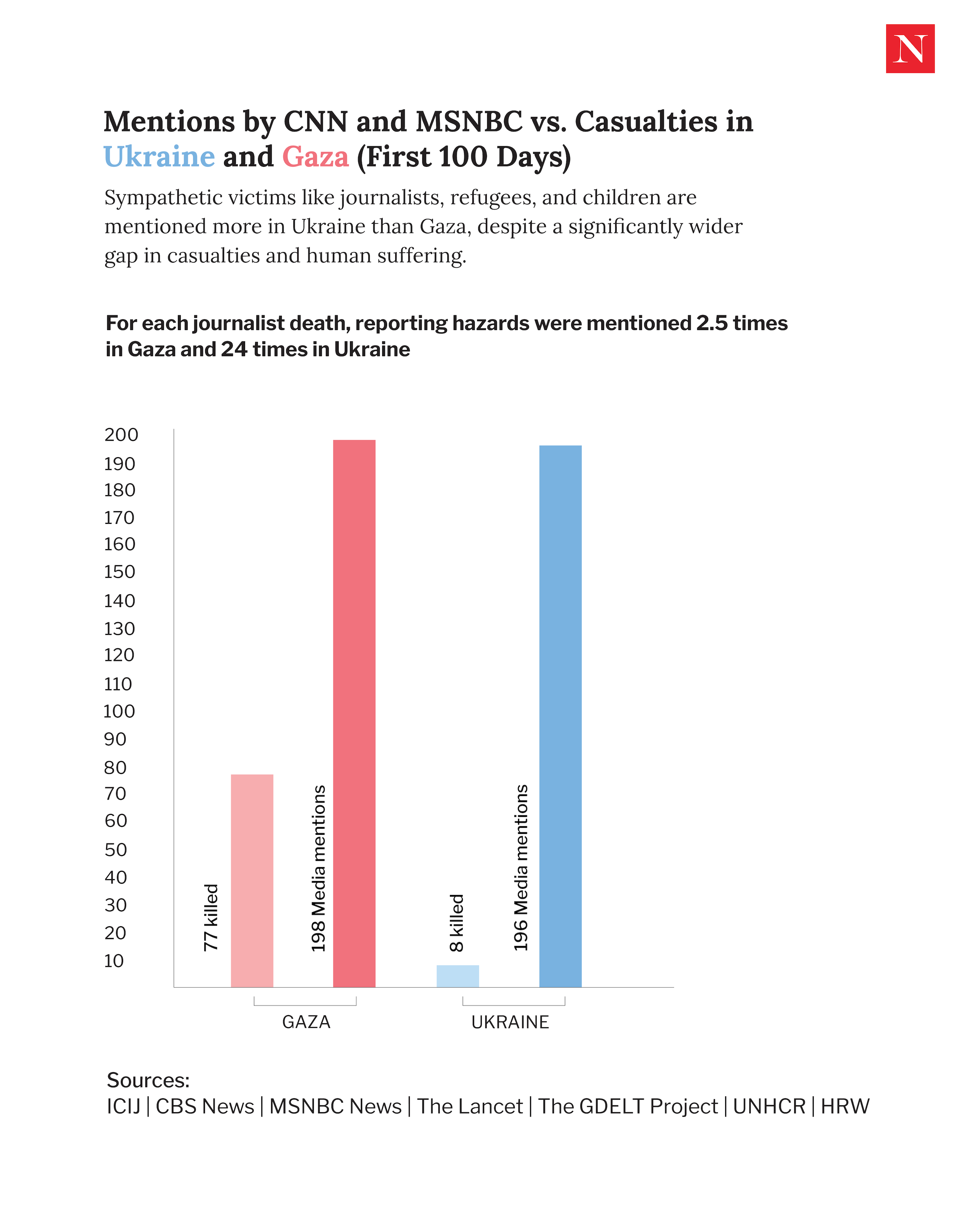
Qualitatively, MSNBC did not run a single segment in the first 100 days that focused specifically and exclusively on the plight of children in Gaza. (Joy-Ann Reid did run a segment on October 25 on civilian deaths with Hani Almadhoun and Daniel Levy that mentioned child deaths a handful of times). MSNBC ran over a dozen segments focusing specifically on the plight of Ukrainian children during the first 100 days of that conflict.
Popular
“swipe left below to view more authors”Swipe →Humanizing coverage of refugees was entirely asymmetrical as well. A much greater percentage of the population in Gaza was displaced or turned into refugees (33 percent versus 80 percent). Yet, Ukrainians were described as refugees, displaced, or related terms eight times more often than Palestinians (1,663 vs 211). MSNBC aired several longer–form, sympathetic profile segments on Ukrainian refugees while running no such long-form segments exclusively on Palestinians displaced in and from Gaza.
Finding 2: On CNN and MSNBC, emotive words such as “brutal,” “massacre,” “slaughter, “barbaric,” and “savage” were overwhelmingly used to describe the killing of Israelis and Ukrainians, and almost never used to describe the killing of Palestinians.
Narrowing our scope to the first 30 days of each conflict**, we see that emotive words such as “brutal,” “massacre,” “slaughter, “barbaric,” and “savage” were overwhelmingly used to describe the killing of Israelis and Ukrainians, and almost never that of Palestinians.
By October 11, the official death toll in Gaza had passed that of the October 7 attack, but the rising death count and humanitarian crisis unfolding in Gaza did not get the sympathetic, emotive treatment that the victims of the October 7 attack did. By the end of our survey sample, November 7, the Palestinian death toll was over 10,000—with an estimated 70 percent of the victims women and children.
Nevertheless, over that 30-day survey period, CNN and MSNBC used emotive words to describe the killing of Israelis 1,053 times and Palestinians only 43 times.
MSNBC anchors, guests, and reporters used the term “savage” 23 times, “barbaric” 46 times, “brutal” 146 times, “massacre” 177 times,” and “slaughter” 102 times in reference to Israelis being killed, namely on October 7. The killing of Palestinians was never called “barbaric” or “savage,” and was referred to as a “slaughter” four times and “massacre” eight times. It was referred to as “brutal” five times.
CNN had almost an identical breakdown: its anchors, guests, and reporters referred to the killing of Israelis as “savage” 13 times, “barbaric” 56 times, “brutal” 186 times, “massacre” 225 times, and “slaughter” 79 times. Israel’s killing of Palestinian civilians—despite being almost three times greater by the end of the survey period—was never called “barbaric,” or “savage.” It was called “brutal” 8 times, a massacre” 16 times, and a “slaughter” twice—both when playing a clip from the Palestinian representative to the UN in reference to the Al-Ahli Arab Hospital on October 17.
The killing of Ukrainians by Russia was qualified with these emotive terms on air by CNN and MSNBC anchors, guests, and reporters 661 times in the first month after Russia’s invasion.
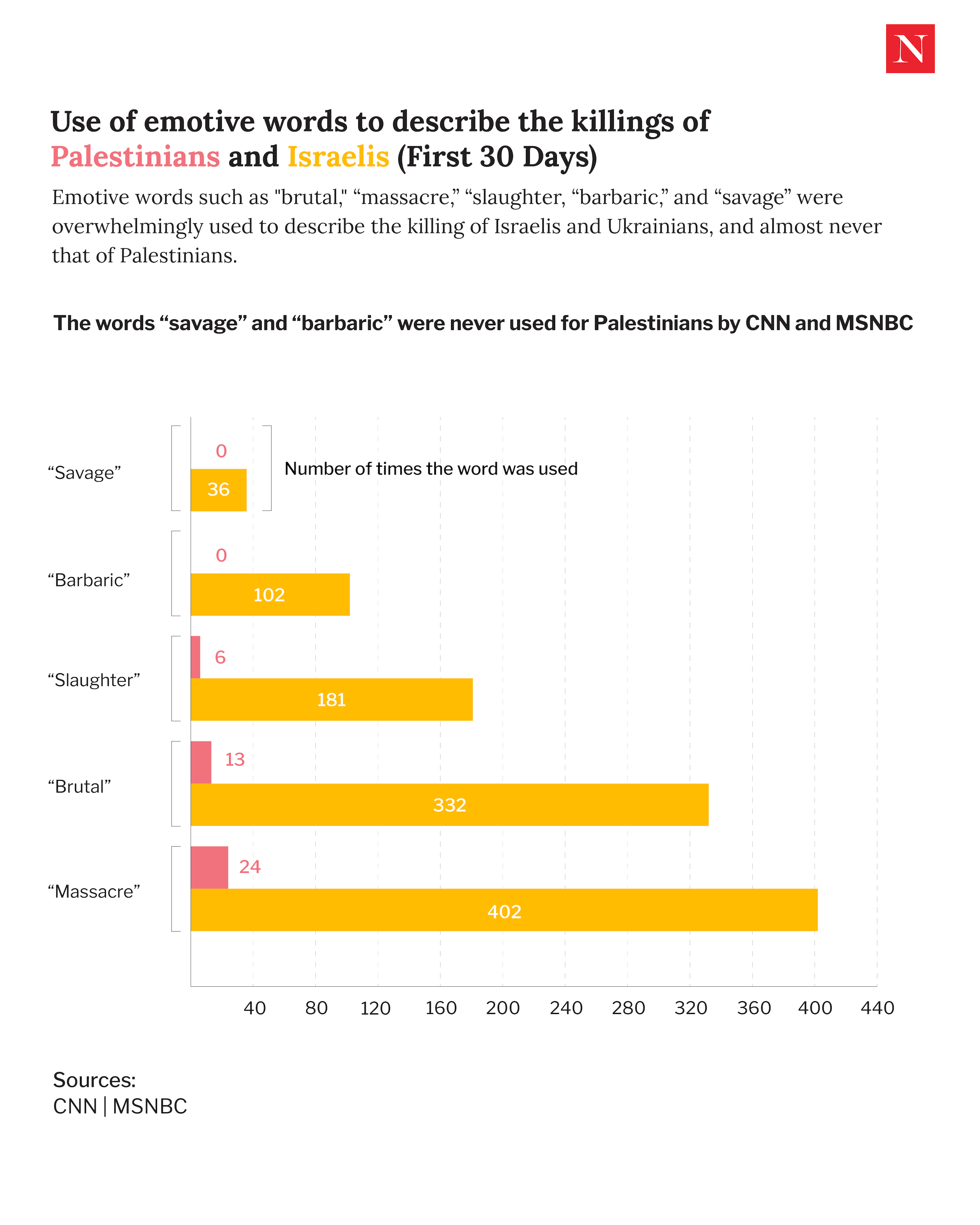
One common rejoinder to this double standard is that Israel doesn’t intentionally kill civilians, whereas Hamas and Russia do. But this assertion is based entirely on unsubstantiated conventional wisdom and is belied by scores of data points.
Aside from the fact that IDF personnel routinely film themselves committing apparent war crimes, there are numerous reports from third-party organizations as varied as Human Rights Watch, Amnesty International, Oxfam, Independent International Commission of Inquiry on the Occupied Palestinian Territory, and even the US State Department documenting the deliberate targeting of civilians and the use of collective punishment. The International Court of Justice’s January 26 ruling laid out several points of evidence showing the targeting of civilians and civilian infrastructure. Law for Palestine, a group of legal researchers, has collected these and hundreds more pieces of evidence detailing Israeli officials’ genocidal intent, including top Israeli officials expressing their intent to depopulate Gaza and engage in collective punishment:
- October 9: “I have ordered a complete siege on the Gaza Strip. There will be no electricity, no food, no fuel, everything is closed. We are fighting human animals and we are acting accordingly.” —Defense Minister Yoav Gallant
- October 14: “There are no innocent civilians in Gaza” —Israeli President Isaac Herzog
- November 7: “You must remember what Amalek has done to you, says our Holy Bible—we do remember.” —Prime Minister Benjamin Netanyahu, referring to the ancient enemy of the Israelites, in scripture interpreted by scholars as a call to exterminate their “men and women, children and infants.”
- December 21: The Washington Post’s John Hudson reports that Prime Minister Benjamin Netanyahu lobbied the United States and other countries to help facilitate the ethnic cleansing of Gaza: “In private encounters, Netanyahu urged Biden, Sunak and Macron to pressure Egyptian President Sisi to take hundreds of thousands of Palestinians from Gaza into the Sinai.”
Civilians’ being shredded by bombs and subjected to a policy of collective punishment via starvation, nonstop displacement, and disease is no less “brutal,” “savage,” or “barbaric” than civilians’ being shot at close range by a militant with a gun (though. to be clear, Israeli forces do this as well). There is no rational, journalistic reason to make this moral delineation other than chauvinist editorializing.
Finding 3: CNN and MSNBC covered the impact of Russia’s invasion on civilians twice as often as they did the impact of Israel’s bombing and siege of Gaza on civilians, despite the latter having a death toll five times that of the former.
In the first 100 days of the respective conflicts, CNN and MSNBC covered Ukrainian civilian suffering almost twice as often as they covered that in Gaza, despite the latter’s having a civilian death toll, during the allotted time frame, 500 percent greater than the latter.*
CNN anchors, reporters, and on-air guests mentioned Ukrainian civilians 15,593 times from February 24, 2022 to June 4, 2022. In contrast, they mentioned civilians in Gaza 7,569 times from October 7, 2023, to January 14, 2024. MSNBC anchors, reporters, and on-air guests mentioned Ukrainian civilians 13,941 times, versus 7,493 mentions of civilians in Gaza.
The discrepancy was evident in primetime coverage on MSNBC, namely from highly influential, agenda-setting shows such as The Rachel Maddow Show, The Last Word with Lawrence O’Donnell, and Deadline: White House with host Nicolle Wallace. Maddow and her guests mentioned Ukrainian civilians 3.4 times more than civilians in Gaza**, O’Donnell and his guests mentioned Ukrainian civilians 2.3 times more than civilians in Gaza, and Wallace and her guests mentioned Ukrainian civilians 3.2 times more than civilians in Gaza. All In host Chris Hayes mentioned Ukrainian civilians 1.8 times more than civilians in Gaza.
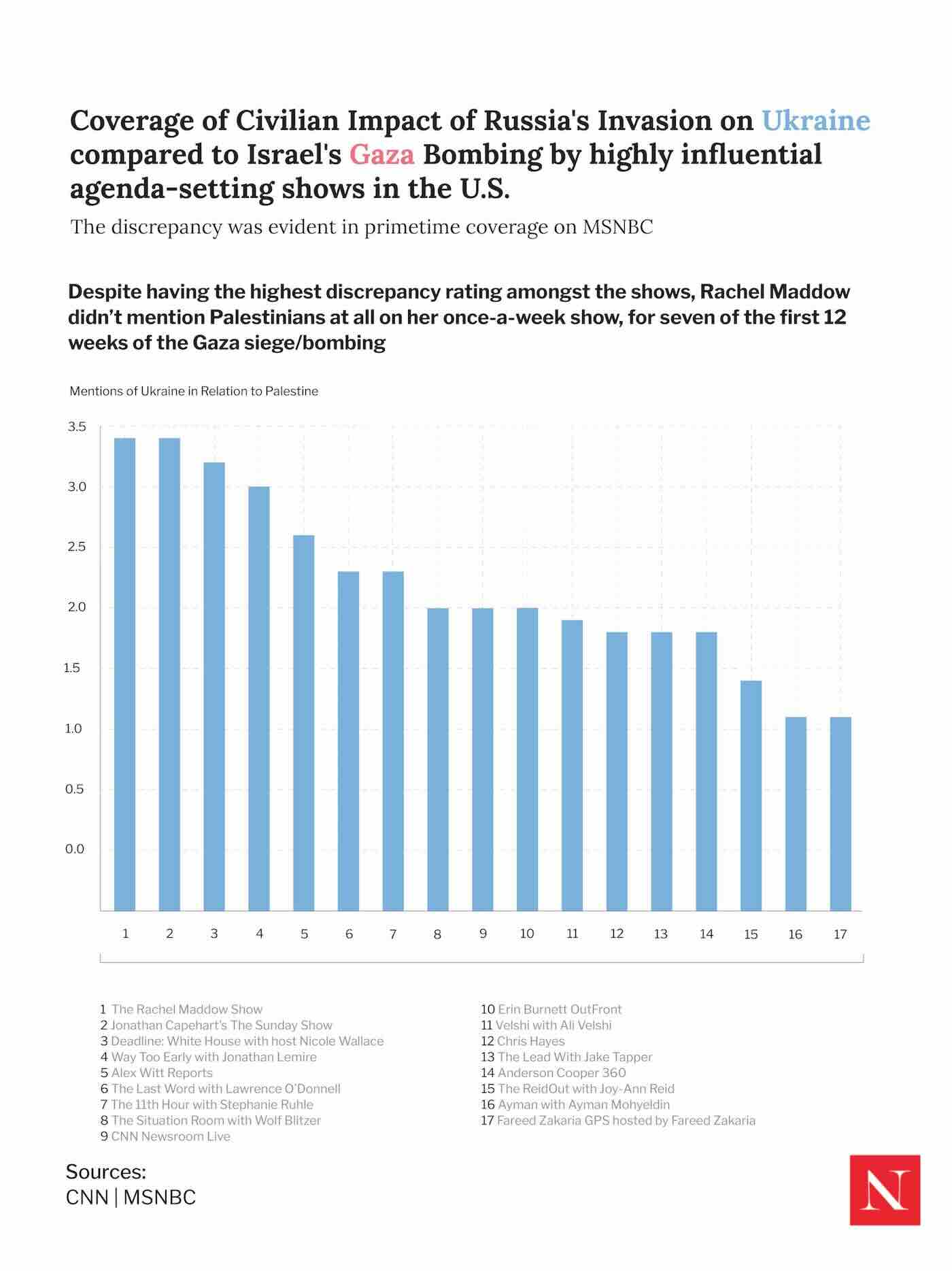
In fact, for seven of the first 12 weeks of the Gaza assault, Rachel Maddow didn’t mention Palestinians at all on her once-a-week show.
Jonathan Capehart’s The Sunday Show tied Maddow for the biggest discrepancy of any MSNBC or CNN show, mentioning Ukrainian civilians 739 times versus 218 times for civilians in Gaza (3.4x). Other popular shows had similarly wide discrepancies: Way Too Early With Jonathan Lemire (3x), Alex Witt Reports (2.6x), The 11th Hour With Stephanie Ruhle (2.3x), and Velshi with Ali Velshi (1.9x)
CNN’s coverage of Palestinian civilians had slightly more parity, but was still generally 1.5x to 2x. The Situation Room With Wolf Blitzer mentioned Ukrainian civilians 2 times more than those in Gaza, as did CNN Newsroom Live and Erin Burnett OutFront. The Lead With Jake Tapper had a ratio of 1.8x, as did Anderson Cooper 360.
Three notable exceptions were The ReidOut with Joy-Ann Reid (1.4x), Ayman with Ayman Mohyeldin (1.1x), and Fareed Zakaria GPS (1.1x), which all gave closer to equal weight to the civilian deaths in Gaza and Ukraine and, qualitatively, had much deeper, humanizing coverage of Palestinian suffering in Gaza. The Mehdi Hasan Show could not be accurately analyzed because it was canceled by MSNBC about 6 weeks into the Gaza siege and bombing, following reports of post-October 7 anti-Muslim bias at the network.
It’s important to note that a significant portion of these mentions of Palestinian civilian deaths were perfunctory and brief, and often prefaced with the vaguely discrediting qualifier “according to Hamas-run/Hamas-controlled health officials.” In the full 100-day survey period, CNN used the “Hamas-run” label 247 times and MSNBC used it 137 times. These labels went virtually unused prior to October 17, when an explosion killed hundreds at the Al-Ahli Arab Hospital. Israel, the White House, and mainstream outlets blamed a stray Palestinian Islamic Jihad rocket, Palestinians, and other forensic experts have cast serious doubts on this consensus, but the subsequent coverage surrounding the media coverage resulted in an emerging editorial standard in US outlets to add an air of suspicion when citing death figures from the Gaza Health Ministry.
The Guardian reported in February that CNN sent a standard memo that “said that any reference to casualty figures from the Gaza health ministry must say it is ‘Hamas-controlled’, implying,” according to The Guardian, “that reports of the deaths of thousands of children were unreliable even though the World Health Organization and other international bodies have said they are largely accurate.”
Several third-party human rights organizations, including the WHO and Human Rights Watch, have publicly vouched for the Gaza health ministry figures. They’ve also been used by the US State Department for years. But this didn’t stop the qualifiers from being used. Moreover, no comparable skeptical label was used when citing death totals provided by Ukrainian or Israeli authorities; they were simply asserted as facts—even though, for instance, Israel repeatedly revised the October 7 death toll.
Finding 4: On CNN and MSNBC, the words “war crime” or “genocide” were mentioned over 17 times more in the context of Ukraine than they were in the context of Gaza.
Despite both Russia and Israel’s committing numerous documented war crimes, and both countries’ being accused of genocide by various international bodies (for the purposes of this study, we will not litigate the comparative merits of either case), the totalizing, moral labels of “war crime” and “genocide” were used on CNN and MSNBC 17.2 times more often in the context of Russia’s invasion of Ukraine than Israsel’s action in Gaza.
A review of the first 30 days of CNN and MSNBC coverage of the respective conflicts reveals that Ukrainian victims were said—on air, by anchors, guests, or reporters—to be subject to genocide or war crimes a total of 1,790 times (1,515 for war crimes and 275 for genocide) compared to 104 times when the victim in question was Palestinian (92 for war crimes, 12 for genocide).***
During our survey period, CNN anchors, guests, or reporters referred to Palestinian victims as subject to “genocide” five times and “war crimes” 57 times. CNN anchors, guests, or reporters referred to Ukrainians as subject to genocide 157 times and “war crimes” 774 times.
MSNBC anchors, guests, or reporters referred to Palestinian victims as subject to “genocide” seven times and “war crimes” 35 times. MSNBC anchors, guests, or reporters referred to Ukrainians as subject to genocide 118 times and “war crimes” 741 times.
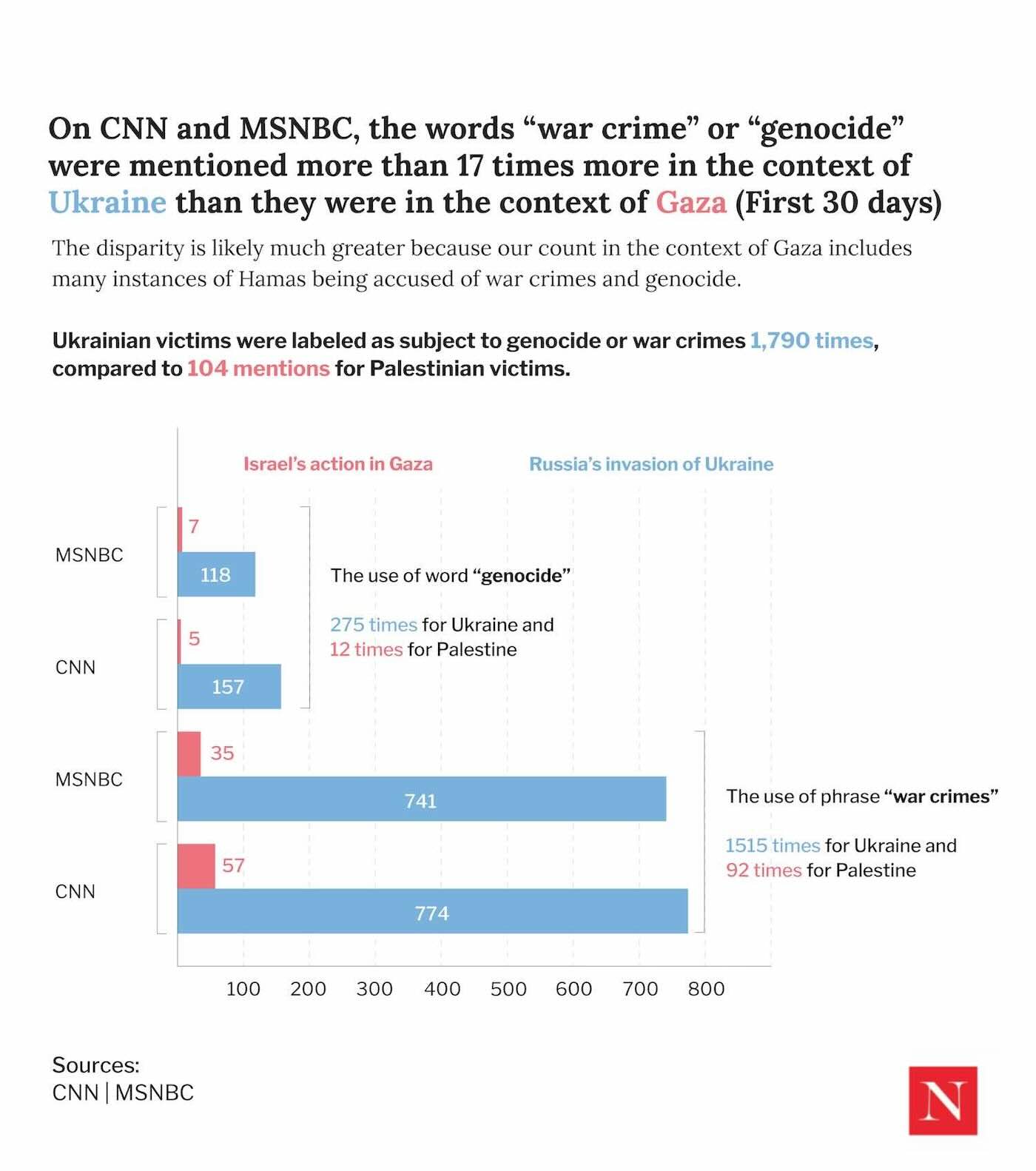
Ostensibly non-opinionated reporters and “analysts” on both MSNBC and CNN often asserted, as a matter of fact, that Russia was committing war crimes against Ukrainians, without this being seen as violating their neutrality. There are no examples of their doing so when describing Israeli war crimes.
In one particularly ironic example, Andrea Mitchell Reports guest Jeh Johnson—who was simply introduced as “former Homeland Security Secretary and Pentagon official,” flatly asserted that Russia was committing war crimes. What MSNBC didn’t disclose is that Johnson is on the board of directors of Lockheed Martin, which has provided the fighter jets and bombs that have helped Israel carry out numerous civilian deaths in Gaza.
Due to a combination of anti-Arab/Muslim racism and the fact that Palestinians are being killed by US-made bombs, approved by a Democratic US president, American agency is largely removed, and Gaza is routinely turned into a natural disaster zone rather than what it is: an unprecedented mass killing event with deliberate authors and patrons, often with documented genocidal intent.
This survey of CNN and MSNBC coverage is quantitative evidence of a double standard in both empathy and emphasis during the early weeks of conflict—when moral narratives are cemented and sympathies are shaped for the public. Palestinian victims are made abstract, rarely given humanizing portraits, and their killings are seen as incidental and unintended. The killing of Ukrainians and Israelis, however, is put in stark moral terms, broadly presented as deliberate. This is just one part of a broader regime of media dehumanization that makes the ongoing decimation of Gaza palatable to the American public whose leaders continue to arm and fund it.
____
* The UN estimated that around 4,000 civilians had been killed 100 days into the Ukraine war. The broadly accepted death toll in Gaza for the first 100 days is over 24,000, but this is a figure that doesn’t distinguish between civilians and non civilians. So, in the interest of being conservative, we are using the civilian death toll of 20,000—though this number, as several researchers have explained, is almost certainly a massive undercount because it only includes confirmed deaths, not those unidentified, under rubble, or dying from secondary causes such as preventable illness, starvation, etc.
** Because The Rachel Maddow Show had a different schedule during the Ukraine survey sample and the Gaza survey sample, we took an average per show rather than a raw total. The data can be seen here.
*** This analysis was done by looking at every single example and making an editorial determination given the context of the text, so it was limited to 30 days. You can review our determinations here.
More from The Nation

Luigi Mangione Is America Whether We Like It or Not Luigi Mangione Is America Whether We Like It or Not
While very few Americans would sincerely advocate killing insurance executives, tens of millions have likely joked that they want to. There’s a clear reason why.

My Dystopian Novel Predicted Trump 2.0 My Dystopian Novel Predicted Trump 2.0
SOLIS was meant to serve as a warning of what could come. With Trump’s reelection, it should serve as a blueprint for the bravery and activism needed to fight back.

President Biden Should Issue a Blanket Pardon of Undocumented Immigrants President Biden Should Issue a Blanket Pardon of Undocumented Immigrants
Protecting Trump’s enemies from prosecution just reinforces the idea of politics as retribution. Instead, Democrats should be defending his most vulnerable targets.

The Supreme Court’s Hearing on Trans Rights Was Bigotry Masquerading as Law The Supreme Court’s Hearing on Trans Rights Was Bigotry Masquerading as Law
The conservative majority spent much of the oral arguments for US v. Skrmetti trying to erase the trans community.

Will There Be a Bird Flu Epidemic Under Trump? Will There Be a Bird Flu Epidemic Under Trump?
H5N1 currently poses a real threat for human transmission. Meanwhile, Trump’s picks for public health roles don’t bode well for vaccination.

Trans Medicine’s “Merchants of Doubt” Trans Medicine’s “Merchants of Doubt”
There is plenty of uncertainty involved in gender-affirming care—as in most aspects of medicine. But the groups behind the Tennessee ban aren’t driven by science—or patient care.


